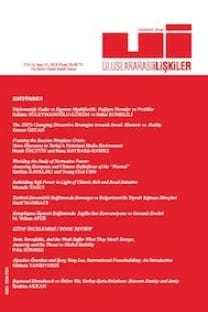Aydınlanma Döneminden Günümüze Bilimsel Bilginin Temelindeki Ana Sorunsal: İdealizm-Materyalizm Tartışması ve Diyalektik Yöntem
Gerçekliğe ilişkin bilginin nereden kaynaklandığı ve bu bilgiye nasıl ulaşılacağı felsefeye ait bir tartışma alanı gibi görünmektedir. Bununla birlikte, günümüzde sosyal bilimler alanında çalışma yapan bilim insanları farkında olarak veya olmayarak bu soruya yanıt arayan iki farklı paradigma olan İdealizm ve Materyalizm içinden bilgi üretmektedir. Bu iki paradigma ve iç türevleri dışında bilgiye ulaşma yönteminde ana ayrım diyalektik yaklaşıma sahip olup olmamakla ortaya çıkmaktadır ki, bu ayrım bilginin bilimsel olup olmadığının başlıca belirleyicisidir. Bu çalışmanın amacı, sosyal bilimlerdeki idealist-materyalist ayrışmasının genel eğilimlerini ve diyalektik anlayışın süreçteki rolünü Aydınlanma döneminden günümüze kadar devam eden süreç içinde öne çıkan kuramlar bağlamında analiz etmek ve 1900’lerden günümüze kapitalist üretim ilişkilerinde yaşanan dönüşümlerin gerçekliğin tanımına ilişkin teorik yaklaşımları nasıl bilimsellikten uzaklaşarak salt öznenin bilinci veya öznesiz ilişkiler ağına indirgediğini eleştirel bir şekilde değerlendirmektir.
The Fundamental Question Underlying Scientific Knowledge since the Age of Enlightenment: Idealism versus Materialism Debate and the Dialectical Method
It appears that where knowledge about reality originates from and how one can reach that knowledge is a topic to be discussed within philosophy. On the other hand, scientists who are doing research in social sciences are, either knowingly or unknowingly, producing knowledge within Idealism and Materialism, which are two paradigms searching for an answer to this question. The main distinction in the method used to reach knowledge, except for the ones in these two paradigms and their internal derivatives, emerges according to whether a dialectical approach is utilized, and this distinction is the main determiner of whether knowledge is scientific or not. The aim of this study is to analyze the general inclinations of the idealist-materialist distinction in social sciences and the role of the dialectical approach used in this process in line with the institutions that have stood out from the Age of Enlightenment up to this date. The study also aims to criticize the consequences of transformations in capitalist accumulation model throughout 1900s and their effects on theoretical approaches which become distant to scientific understanding and define reality just in accordance with human consciousness or post-human social network system.
Keywords:
Hegel, Marx, Philosophy, Entity, Consciousness, Postmodernism,
- ISSN: 1304-7310
- Başlangıç: 2004
- Yayıncı: Uluslararası İlişkiler Konseyi Derneği İktisadi İşletmesi
Sayıdaki Diğer Makaleler
Murat BELGE, Militarist Modernization: Germany, Japan and Turkey
Avrupa Birliği Genişlemesinde Azınlık Koşulu: Doğu Genişlemesi ve Türkiye
Barry BUZAN, An Introduction to the English School ofInternational Relations
Kürdistan Bölgesel Yönetimi: Rantçı Devlet Yaklaşımı Çerçevesinde Bir Değerlendirme
Anayasa’da “Milletlerarası Hukukun Meşru Saydığı Haller” Sorunu
